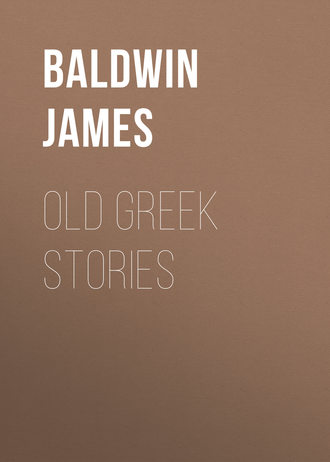
Baldwin James
Old Greek Stories
And now all the company started back to the city. Some carried the boar's huge head, and some the different parts of his body, while others had made biers of the green branches, and bore upon them the dead bodies of those who had been slain. It was indeed a strange procession.
A young man who did not like Meleager, had run on in front and had reached the city before the rest of the company had fairly started. Queen Althea was standing at the door of the palace, and when she saw him she asked what had happened in the forest He told her at once that Meleager had killed her brothers, for he knew that, with all their faults, she loved them very dearly. It was terrible to see her grief. She shrieked, and tore her hair, and rushed wildly about from room to room. Her senses left her, and she did not know what she was doing.
It was the custom at that time for people to avenge the death of their kindred, and her only thought was how to punish the murderer of her brothers. In her madness she forgot that Meleager was her son. Then she thought of the three Fates and of the unburned firebrand which she had locked up in her chest so many years before. She ran and got the stick and threw it into the fire that was burning on the hearth.
It kindled at once, and she watched it as it blazed up brightly. Then it began to turn into ashes, and as the last spark died out, the noble Meleager, who was walking by the side of Atalanta, dropped to the ground dead.
When they carried the news to Althea she said not a word, for then she knew what she had done, and her heart was broken. She turned silently away and went to her own room. When the king came home a few minutes later, he found her dead.
So ended the hunt in the wood of Calydon.
V. THE RACE FOR A WIFE
After the death of Meleager, Atalanta went back to her old home among the mountains of Arcadia. She was still the swift-footed huntress, and she was never so happy as when in the green woods wandering among the trees or chasing the wild deer. All the world had heard about her, however; and the young heroes in the lands nearest to Arcadia did nothing else but talk about her beauty and her grace and her swiftness of foot and her courage. Of course every one of these young fellows wanted her to become his wife; and she might have been a queen any day if she had only said the word, for the richest king in Greece would have been glad to marry her. But she cared nothing for any of the young men, and she liked the freedom of the green woods better than all the fine things she might have had in a palace.
The young men would not take "No!" for an answer, however. They could not believe that she really meant it, and so they kept coming and staying until the woods of Arcadia were full of them, and there was no getting along with them at all. So, when she could think of no other way to get rid of them, Atalanta called them together and said:
"You want to marry me, do you? Well, if any one of you would like to run a race with me from this mountain to the bank of the river over there, he may do so; and I will be the wife of the one who outruns me."
"Agreed! agreed!" cried all the young fellows.
"But, listen!" she said. "Whoever tries this race must also agree that if I outrun him, he must lose his life."
Ah, what long faces they all had then! About half of them drew away and went home.
"But won't you give us the start of you a little?" asked the others.
"Oh, yes," she answered. "I will give you the start by a hundred paces. But remember, if I overtake any one before he reaches the river, he shall lose his head that very day."
Several others now found that they were in ill health or that business called them home; and when they were next looked for, they were not to be found. But a good many who had had some practice in sprinting across the country stayed and made up their minds to try their luck. Could a mere girl outrun such fine fellows as they? Nonsense!
And so it happened that a race was run almost every day. And almost every day some poor fellow lost his head; for the fleetest-footed sprinter in all Greece was overtaken by Atalanta long before he could reach the river bank. But other young men kept coming and coming, and no sooner had one been put out of the way than another took his place.
One day there came from a distant town a handsome, tall young man named Meilanion.
"You'd better not run with me," said Atalanta, "for I shall be sure to overtake you, and that will be the end of you."
"We'll see about that," said Meilanion.
Now Meilanion, before coming to try his chance, had talked with Venus, the queen of love, who lived with Jupiter among the clouds on the mountain top. And he was so handsome and gentle and wise that Venus took pity on him, and gave him three golden apples and told him what to do.
Well, when all was ready for the race, Atalanta tried again to persuade Meilanion not to run, for she also took pity on him.
"I'll be sure to overtake you," she said.
"All right!" said Meilanion, and away he sped; but he had the three golden applies in his pocket.
Atalanta gave him a good start, and then she followed after, as swift as an arrow shot from the bow. Meilanion was not a very fast runner, and it would not be hard for her to overtake him. She thought that she would let him get almost to the goal, for she really pitied him. He heard her coming close behind him; he heard her quick breath as she gained on him very fast. Then he threw one of the golden apples over his shoulder.
Now, if there was anything in the world that Atalanta admired, it was a bright stone or a pretty piece of yellow gold. As the apple fell to the ground she saw how beautiful it was, and she stopped to pick it up; and while she was doing this, Meilanion gained a good many paces. But what of that? In a minute she was as close behind him as ever. And yet, she really did pity him.
Just then Meilanion threw the second apple over his shoulder. It was handsomer and larger than the first, and Atalanta could not bear the thought of allowing some one else to get it. So she stopped to pick it up from among the long grass, where it had fallen. It took somewhat longer to find it than she had expected, and when she looked up again Meilanion was a hundred feet ahead of her. But that was no matter. She could easily overtake him. And yet, how she did pity the foolish young man!
Meilanion heard her speeding like the wind behind him. He took the third apple and threw it over to one side of the path where the ground sloped towards the river. Atalanta's quick eye saw that it was far more beautiful than either of the others. If it were not picked up at once it would roll down into the deep water and be lost, and that would never do. She turned aside from her course and ran after it. It was easy enough to overtake the apple, but while she was doing so Meilanion gained upon her again. He was almost to the goal. How she strained every muscle now to overtake him! But, after all, she felt that she did not care very much. He was the handsomest young man that she had ever seen, and he had given her three golden apples. It would be a great pity if he should have to die. And so she let him reach the goal first.
After that, of course, Atalanta became Meilanion's wife. And he took her with him to his distant home, and there they lived happily together for many, many years.
THE HORSE AND THE OLIVE
I. FINDING A KING
On a steep stony hill in Greece there lived in early times a few very poor people who had not yet learned to build houses. They made their homes in little caves which they dug in the earth or hollowed out among the rocks; and their food was the flesh of wild animals, which they hunted in the woods, with now and then a few berries or nuts. They did not even know how to make bows and arrows, but used slings and clubs and sharp sticks for weapons; and the little clothing which they had was made of skins. They lived on the top of the hill, because they were safe there from the savage beasts of the great forest around them, and safe also from the wild men who sometimes roamed through the land. The hill was so steep on every side that there was no way of climbing it save by a single narrow footpath which was always guarded by some one at the top.
One day when the men were hunting in the woods, they found a strange youth whose face was so fair and who was dressed so beautifully that they could hardly believe him to be a man like themselves. His body was so slender and lithe, and he moved so nimbly among the trees, that they fancied him to be a serpent in the guise of a human being; and they stood still in wonder and alarm. The young man spoke to them, but they could not understand a word that he said; then he made signs to them that he was hungry, and they gave him something to eat and were no longer afraid. Had they been like the wild men of the woods, they might have killed him at once. But they wanted their women and children to see the serpent man, as they called him, and hear him talk; and so they took him home with them to the top of the hill. They thought that after they had made a show of him for a few days, they would kill him and offer his body as a sacrifice to the unknown being whom they dimly fancied to have some sort of control over their lives.
But the young man was so fair and gentle that, after they had all taken a look at him, they began to think it would be a great pity to harm him. So they gave him food and treated him kindly; and he sang songs to them and played with their children, and made them happier than they had been for many a day. In a short time he learned to talk in their language; and he told them that his name was Cecrops, and that he had been shipwrecked on the seacoast not far away; and then he told them many strange things about the land from which he had come and to which he would never be able to return. The poor people listened and wondered; and it was not long until they began to love him and to look up to him as one wiser than themselves. Then they came to ask him about everything that was to be done, and there was not one of them who refused to do his bidding.
So Cecrops-the serpent man, as they still called him-became the king of the poor people on the hill. He taught them how to make bows and arrows, and how to set nets for birds, and how to take fish with hooks. He led them against the savage wild men of the woods, and helped them kill the fierce beasts that had been so great a terror to them. He showed them how to build houses of wood and to thatch them with the reeds which grew in the marshes. He taught them how to live in families instead of herding together like senseless beasts as they had always done before. And he told them about great Jupiter and the Mighty Folk who lived amid the clouds on the mountain top.
II. CHOOSING A NAME
By and by, instead of the wretched caves among the rocks, there was a little town on the top of the hill, with neat houses and a market place; and around it was a strong wall with a single narrow gate just where the footpath began to descend to the plain. But as yet the place had no name.
One morning while the king and his wise men were sitting together in the market place and planning how to make, the town become a rich, strong city, two strangers were seen in the street. Nobody could tell how they came there. The guard at the gate had not seen them; and no man had ever dared to climb the narrow footway without his leave. But there the two strangers stood. One was a man, the other a woman; and they were so tall, and their faces were so grand and noble, that those who saw them stood still and wondered and said not a word.
The man had a robe of purple and green wrapped round his body, and he bore in one hand a strong staff with three sharp spear points at one end. The woman was not beautiful, but she had wonderful gray eyes; and in one hand she carried a spear and in the other a shield of curious workmanship.
"What is the name of this town?" asked the man.
The people stared at him in wonder, and hardly understood his meaning. Then an old man answered and said, "It has no name. We who live on this hill used to be called Cranae; but since King Cecrops came, we have been so busy that we have had no time to think of names."
"Where is this King Cecrops?" asked the woman.
"He is in the market place with the wise men," was the answer.
"Lead us to him at once," said the man.
When Cecrops saw the two strangers coming into the market place, he stood up and waited for them to speak. The man spoke first:
"I am Neptune," said he, "and I rule the sea."
"And I am Athena," said the woman, "and I give wisdom to men."
"I hear that you are planning to make your town become a great city," said Neptune, "and I have come to help you. Give my name to the place, and let me be your protector and patron, and the wealth of the whole world shall be yours. Ships from every land shall bring you merchandise and gold and silver; and you shall be the masters of the sea."
"My uncle makes you fair promises," said Athena; "but listen to me. Give my name to your city, and let me be your patron, and I will give you that which gold cannot buy: I will teach you how to do a thousand things of which you now know nothing. I will make your city my favorite home, and I will give you wisdom that shall sway the minds and hearts of all men until the end of time."
The king bowed, and turned to the people, who had all crowded into the market place. "Which of these mighty ones shall we elect to be the protector and patron of our city?" he asked. "Neptune offers us wealth; Athena promises us wisdom. Which shall we choose?"
"Neptune and wealth!" cried many.
"Athena and wisdom!" cried as many others.
At last when it was plain that the people could not agree, an old man whose advice was always heeded stood up and said:
"These mighty ones have only given us promises, and they have promised things of which we are ignorant. For who among us knows what wealth is or what wisdom is? Now, if they would only give us some real gift, right now and right here, which we can see and handle, we should know better how to choose."
"That is true! that is true!" cried the people.
"Very well, then," said the strangers, "we will each give you a gift, right now and right here, and then you may choose between us."
Neptune gave the first gift. He stood on the highest point of the hill where the rock was bare, and bade the people see his power. He raised his three-pointed spear high in the air, and then brought it down with great force. Lightning flashed, the earth shook, and the rock was split half way down to the bottom of the hill. Then out of the yawning crevice there sprang a wonderful creature, white as milk, with long slender legs, an arching neck, and a mane and tail of silk.
The people had never seen anything like it before, and they thought it a new kind of bear or wolf or wild boar that had come out of the rock to devour them. Some of them ran and hid in their houses, while others climbed upon the wall, and still others grasped their weapons in alarm. But when they saw the creature stand quietly by the side of Neptune, they lost their fear and came closer to see and admire its beauty.
"This is my gift," said Neptune. "This animal will carry your burdens for you; he will draw your chariots; he will pull your wagons and your plows; he will let you sit on his back and will run with you faster than the wind."
"What is his name?" asked the king.
"His name is Horse," answered Neptune.
Then Athena came forward. She stood a moment on a green grassy plot where the children of the town liked to play in the evening. Then she drove the point of her spear deep down in the soil. At once the air was filled with music, and out of the earth there sprang a tree with slender branches and dark green leaves and white flowers and violet green fruit.
"This is my gift," said Athena. "This tree will give you food when you are hungry; it will shelter you from the sun when you are faint; it will beautify your city; and the oil from its fruit will be sought by all the world."
"What is it called?" asked the king.
"It is called Olive," answered Athena.
Then the king and his wise men began to talk about the two gifts.
"I do not see that Horse will be of much use to us," said the old man who had spoken before. "For, as to the chariots and wagons and plows, we have none of them, and indeed do not know what they are; and who among us will ever want to sit on this creature's back and be borne faster than the wind? But Olive will be a thing of beauty and a joy for us and our children forever."
"Which shall we choose?" asked the king, turning to the people.
"Athena has given us the best gift," they all cried, "and we choose Athena and wisdom!"
"Be it so," said the king, "and the name of our city shall be Athens."
From that day the town grew and spread, and soon there was not room on the hilltop for all the people. Then houses were built in the plain around the foot of the hill, and a great road was built to the sea, three miles away; and in all the world there was no city more fair than Athens.
In the old market place on the top of the hill the people built a temple to Athena, the ruins of which may still be seen. The olive tree grew and nourished; and, when you visit Athens, people will show you the very spot where it stood. Many other trees sprang from it, and in time became a blessing both to Greece and to all the other countries round the great sea. As for the horse, he wandered away across the plains towards the north and found a home at last in distant Thessaly beyond the River Peneus. And I have heard it said that all the horses in the world have descended from that one which Neptune brought out of the rock; but of the truth of this story there may be some doubts.
THE ADVENTURES OF THESEUS
I. AEGEUS AND AETHRA
There was once a king of Athens whose name was AEgeus. He had no son; but he had fifty nephews, and they were waiting for him to die, so that one of them might be king in his stead. They were wild, worthless fellows, and the people of Athens looked forward with dread to the day when the city should be in their power. Yet so long as AEgeus lived they could not do much harm, but were content to spend their time in eating and drinking at the king's table and in quarreling among themselves.
It so happened one summer that AEgeus left his kingdom in the care of the elders of the city and went on a voyage across the Saronic Sea to the old and famous city of Troezen, which lay nestled at the foot of the mountains on the opposite shore. Troezen was not fifty miles by water from Athens, and the purple-peaked island of AEgina lay between them; but to the people of that early time the distance seemed very great, and it was not often that ships passed from one place to the other. And as for going by land round the great bend of the sea, that was a thing so fraught with danger that no man had ever dared try it.
King Pittheus of Troezen was right glad to see AEgeus, for they had been boys together, and he welcomed him to his city and did all that he could to make his visit a pleasant one. So, day after day, there was feasting and merriment and music in the marble halls of old Troezen, and the two kings spent many a happy hour in talking of the deeds of their youth and of the mighty heroes whom both had known. And when the time came for the ship to sail back to Athens, AEgeus was not ready to go. He said he would stay yet a little longer in Troezen, for that the elders of the city would manage things well at home; and so the ship returned without him.
But AEgeus tarried, not so much for the rest and enjoyment which he was having in the home of his old friend, as for the sake of AEthra, his old friend's daughter. For AEthra was as fair as a summer morning, and she was the joy and pride of Troezen; and AEgeus was never so happy as when in her presence. So it happened that some time after the ship had sailed, there was a wedding in the halls of King Pittheus; but it was kept a secret, for AEgeus feared that his nephews, if they heard of it, would be very angry and would send men to Troezen to do him harm.
Month after month passed by, and still AEgeus lingered with his bride and trusted his elders to see to the affairs of Athens. Then one morning, when the gardens of Troezen were full of roses and the heather was green on the hills, a babe was born to AEthra-a boy with a fair face and strong arms and eyes as sharp and as bright as the mountain eagle's. And now AEgeus was more loth to return home than he had been before, and he went up on the mountain which overlooks Troezen, and prayed to Athena, the queen of the air, to give him wisdom and show him what to do. Even while he prayed there came a ship into the harbor, bringing a letter to AEgeus and alarming news from Athens.
"Come home without delay"-these were words of the letter which the elders had sent-"come home quickly, or Athens will be lost. A great king from beyond the sea, Minos of Crete, is on the way with ships and a host of fighting men; and he declares that he will carry sword and fire within our walls, and will slay our young men and make our children his slaves. Come and save us!"
"It is the call of duty," said AEgeus; and with a heavy heart he made ready to go at once across the sea to the help of his people. But he could not take AEthra and her babe, for fear of his lawless nephews, who would have slain them both.
"Best of wives," he said, when the hour for parting had come, "listen to me, for I shall never see your father's halls, nor dear old Troezen, nor perhaps your own fair face, again. Do you remember the old plane tree which stands on the mountain side, and the great flat stone which lies a little way beyond it, and which no man but myself has ever been able to lift? Under that stone, I have hidden my sword and the sandals which I brought from Athens. There they shall lie until our child is strong enough to lift the stone and take them for his own. Care for him, AEthra, until that time; and then, and not till then, you may tell him of his father, and bid him seek me in Athens."
Then AEgeus kissed his wife and the babe, and went on board the ship; the sailors shouted; the oars were dipped into the waves; the white sail was spread to the breeze; and AEthra from her palace window saw the vessel speed away over the blue waters towards AEgina and the distant Attic shore.
II. SWORD AND SANDALS
Year after year went by, and yet no word reached AEthra from her husband on the other side of the sea. Often and often she would climb the mountain above Troezen, and sit there all day, looking out over the blue waters and the purple hills of AEgina to the dim, distant shore beyond. Now and then she could see a white-winged ship sailing in the offing; but men said that it was a Cretan vessel, and very likely was filled with fierce Cretan warriors, bound upon some cruel errand of war. Then it was rumored that King Minos had seized upon all the ships of Athens, and had burned a part of the city, and had forced the people to pay him a most grievous tribute. But further than this there was no news.
In the meanwhile AEthra's babe had grown to be a tall, ruddy-cheeked lad, strong as a mountain lion; and she had named him Theseus. On the day that he was fifteen years old he went with her up to the top of the mountain, and with her looked out over the sea.
"Ah, if only your father would come!" she sighed.
"My father?" said Theseus. "Who is my father, and why are you always watching and waiting and wishing that he would come? Tell me about him."
And she answered: "My child, do you see the great flat stone which lies there, half buried in the ground, and covered with moss and trailing ivy? Do you think you can lift it?"
"I will try, mother," said Theseus. And he dug his fingers into the ground beside it, and grasped its uneven edges, and tugged and lifted and strained until his breath came hard and his arms ached and his body was covered with sweat; but the stone was moved not at all. At last he said, "The task is too hard for me until I have grown stronger. But why do you wish me to lift it?"
"When you are strong enough to lift it," answered AEthra, "I will tell you about your father."
After that the boy went out every day and practiced at running and leaping and throwing and lifting; and every day he rolled some stone out of its place. At first he could move only a little weight, and those who saw him laughed as he pulled and puffed and grew red in the face, but never gave up until he had lifted it. And little by little he grew stronger, and his muscles became like iron bands, and his limbs were like mighty levers for strength. Then on his next birthday he went up on the mountain with his mother, and again tried to lift the great stone. But it remained fast in its place and was not moved.
"I am not yet strong enough, mother," he said.
"Have patience, my son," said AEthra.
So he went on again with his running and leaping and throwing and lifting; and he practiced wrestling, also, and tamed the wild horses of the plain, and hunted the lions among the mountains; and his strength and swiftness and skill were the wonder of all men, and old Troezen was filled with tales of the deeds of the boy Theseus. Yet when he tried again on his seventeenth birthday, he could not move the great flat stone that lay near the plane tree on the mountain side.
"Have patience, my son," again said AEthra; but this time the tears were standing in her eyes.
So he went back again to his exercising; and he learned to wield the sword and the battle ax and to throw tremendous weights and to carry tremendous burdens. And men said that since the days of Hercules there was never so great strength in one body. Then, when he was a year older, he climbed the mountain yet another time with his mother, and he stooped and took hold of the stone, and it yielded to his touch; and, lo, when he had lifted it quite out of the ground, he found underneath it a sword of bronze and sandals of gold, and these he gave to his mother.
"Tell me now about my father," he said.
AEthra knew that the time had come for which she had waited so long, and she buckled the sword to his belt and fastened the sandals upon his feet. Then she told him who his father was, and why he had left them in Troezen, ands how he had said that when the lad was strong enough to lift the great stone, he must take the sword and sandals and go and seek him in Athens.
Theseus was glad when he heard this, and his proud eyes flashed with eagerness as he said: "I am ready, mother; and I will set out for Athens this very day."
Then they walked down the mountain together and told King Pittheus what had happened, and showed him the sword and the sandals. But the old man shook his head sadly and tried to dissuade Theseus from going.
"How can you go to Athens in these lawless times?" he said. "The sea is full of pirates. In fact, no ship from Troezen has sailed across the Saronic Sea since your kingly father went home to the help of his people, eighteen years ago."
Then, finding that this only made Theseus the more determined, he said: "But if you must go, I will have a new ship built for you, stanch and stout and fast sailing; and fifty of the bravest young men in Troezen shall go with you; and mayhap with fair winds and fearless hearts you shall escape the pirates and reach Athens in safety."
"Which is the most perilous way?" asked Theseus-"to go by ship or to make the journey on foot round the great bend of land?"
"The seaway is full enough of perils," said his grandfather, "but the landway is beset with dangers tenfold greater. Even if there were good roads and no hindrances, the journey round the shore is a long one and would require many days. But there are rugged mountains to climb, and wide marshes to cross, and dark forests to go through. There is hardly a footpath in all that wild region, nor any place to find rest or shelter; and the woods are full of wild beasts, and dreadful dragons lurk in the marshes, and many cruel robber giants dwell in the mountains."
"Well," said Theseus, "if there are more perils by land than by sea, then I shall go by land, and I go at once."
"But you will at least take fifty young men, your companions, with you?" said King Pittheus.
"Not one shall go with me," said Theseus; and he stood up and played with his sword hilt, and laughed at the thought of fear.
Then when there was nothing more to say, he kissed his mother and bade his grandfather good-by, and went out of Troezen towards the trackless coastland which lay to the west and north. And with blessings and tears the king and AEthra followed him to the city gates, and watched him until his tall form was lost to sight among the trees which bordered the shore of the sea.
III. ROUGH ROADS AND ROBBERS
With a brave heart Theseus walked on, keeping the sea always upon his right. Soon the old city of Troezen was left far behind, and he came to the great marshes, where the ground sank under him at every step, and green pools of stagnant water lay on both sides of the narrow pathway. But no fiery dragon came out of the reeds to meet him; and so he walked on and on till he came to the rugged mountain land which bordered the western shore of the sea. Then he climbed one slope after another, until at last he stood on the summit of a gray peak from which he could see the whole country spread out around him. Then downward and onward he went again, but his way led him through dark mountain glens, and along the edges of mighty precipices, and underneath many a frowning cliff, until he came to a dreary wood where the trees grew tall and close together and the light of the sun was seldom seen.
In that forest there dwelt a robber giant, called Club-carrier, who was the terror of all the country. For oftentimes he would go down into the valleys where the shepherds fed their flocks, and would carry off not only sheep and lambs, but sometimes children and the men themselves. It was his custom to hide in the thickets of underbrush, close to a pathway, and, when a traveler passed that way, leap out upon him and beat him to death. When he saw Theseus coming through the woods, he thought that he would have a rich prize, for he knew from the youth's dress and manner that he must be a prince. He lay on the ground, where leaves of ivy and tall grass screened him from view, and held his great iron club ready to strike.







